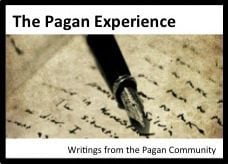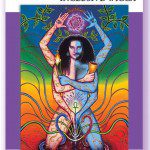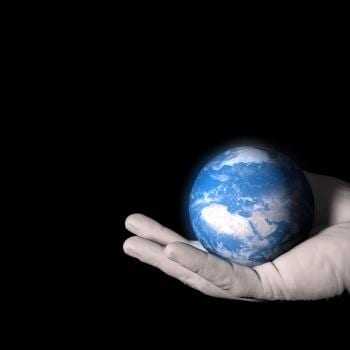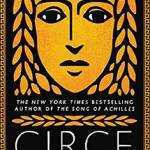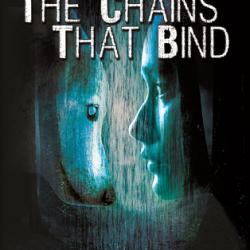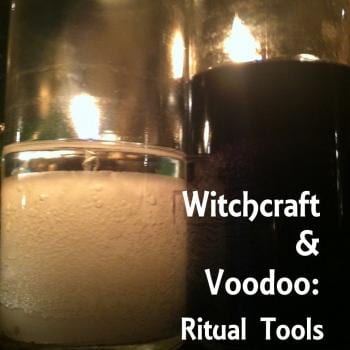
I lost a friend this weekend. He was one of my first mentors in the Craft. I mention him in the dedication in my book as Lord Grunnar. He was diagnosed with some sort of cancer that affected his liver a few weeks ago; his kidneys failed last week and he didn’t respond to dialysis. They put him in palliative care and I made preparations to go and see him.
It took me a few days to get the money together. We put a few days insurance on our little RV and made plans to drive into Saskatchewan. It’s almost halfway across the continent from me (one of the disadvantages of Canada being a very large country with a large land mass) and in order to get there we had to drive through the Rocky Mountains in the snow. In the middle of the night we bounced over a bump in the road and then came down on a sheet of ice. We hit one barrier, then the other, and then the vehicle spun to a stop on the other side of the road. I was sleeping in the back of the RV and already in motion when I woke up. It was dark and stuff was flying everywhere. The table hit me in the knees and something hit me in the back, which completely knocked the wind out of me in a burst of terrible pain. I seriously thought I’d cracked a rib. Things flew out of the cupboards and started rolling around. I felt the RV lean over the barrier at the edge of what I knew to be the cliff and I was certain we were going to die. The barrier that stopped us had just been installed the previous month. We totaled the RV; and we didn’t make the trip to Regina where my friend was, because we spent the next day limping home with our bruises on the Greyhound after sticking whatever we could manage into two large boxes. Grunnar died the following morning.
So having lost a good friend, and having almost died myself, I’m giving a great deal of thought to the Pagan idea of death this week. As with most things Pagan, it’s not a simple matter, is it? A Christian minister can comfortably speak about God and Jesus and Heaven to Christians, with the awareness that whatever their understanding is of that, they can at least agree on this common metaphor. We have no such luxury.
Have you ever taken a moment to really think about it? The fact is that you are going to die someday; you and I and everybody we know. We’re all renting; none of us get to keep the house. So what happens next?
Many of us believe we just stop. There are a number of Humanistic Pagans and Atheopagans out there; much of the modern Neopagan movement comes from the Humanism Movement after all. In our rational, scientific world, it can be challenging to believe in such a thing as an “afterlife” or, indeed, the human soul. For some of us, the seat of consciousness is in the brain, and if it stops, we stop.
Others believe that our consciousness becomes part of the human “race consciousness.” Understanding of that varies from a numinous concept not dissimilar to the New Age idea of the Akashic Records, to the more scientific approach of Isaac Bonewits, who believed that our memories become part of the human genetic memory. I remember being intrigued by this theory when I read it, and thought it a believable rationalist explanation of such phenomena as past-life memories and the like, and I accepted it as a possibility.
Still others believe in reincarnation. I think we picked this idea up from Eastern faiths, but our ideas of how it works differ significantly. Eastern faiths believe in a succession of lives grounded in karmic burdens (the “better” you lived your life, the “better” the next one will be, though different faiths have different opinions about exactly what sort of criteria are used to judge this,) and the ultimate goal is to get off the Karmic Wheel of physicality entirely to unite with the universal onesness that is the Godhead.
The New Age Movement, which influences many Wiccanate Neopagans, believes something that bears a superficial resemblance to this, except that the goal is Ascension, which is to say, becoming an Enlightened Master or Ascended Being. As far as I can tell, this is just a synonym for a powerful non-spiritual being with something to teach, such as a saint or an ancestral lwa. Several ceremonial and chaos magicians, left-hand path and Voodoo practitioners share a similar concept, though again, understanding of the process and criteria vary. For the magicians the determining factor of your possible Ascension is the development of your consciousness; while for the Voodoo practitioners, Druids, and some Wiccans and Neo-shamans, the key is how well you are remembered. I imagine that Reconstructionist faiths that embrace the heroic traditions of European Paganisms might believe this also.
Another approach to reincarnation is just that we will be born again in the physical world; either this one or another that is similar. How this works is up for debate of course. Is this process bound by linear time? What implications might the “many worlds” theory of quantum mechanics have in this process? Do we live in a sequence of interconnected worlds with thin membranes that separate them, and we just keep bouncing around between them? Do we go to other planets? Do we remain human? How do the spirit realms of various cultures, such as Faerie, Alfheim or the Dreamtime, fit into all of that?
And then there is a question of whether or not we go somewhere else before we go on to the next life. For Gerald Gardner, that’s what the Summerlands were; kind of a way-station between worlds, where we wait for our loved ones to join us and then go on to the next life together, until we get tired of it and stay forever in the Land of the Ever-Young (and yes, some Pagan and Wiccan traditions use Tir Na Nog, Albion, Avalon, and/or the Summerlands interchangeably.) I personally like this idea. It’s not dissimilar from the Tibetan idea of the Bardo, which is where one take stock between lives and plans the next one, usually with an interconnected group of people who tend to reincarnate together, perhaps changing roles and genders from life to life. I have had some powerful experiences in which I recall past lives with friends and lovers who are present in my life now. This gives me comfort when someone I care about passes on, because I believe we will meet again.
Polytheists and Reconstructionists often have some very specific beliefs that originate in the culture(s) they emulate. A friend of mine recently wrote a short article on Norse interpretations of the lore, which cleared some things up for me. I imagine that many Kemetics are waiting to enter Duat, and many Hellenisimos are looking forward to Elysium.
For those of us who do believe in Otherworldly afterlives, do we also believe in negative realms? I often wonder if Kemetics consider that their deities may condemn them to have their hearts devoured by Ammut for being unworthy against the Feather; if Hellenisimos accept the possibility of Lethe and dissolution in Hades; and if Celts accept they might end up wandering in Annwn? If negative realms do exist, what are the criteria to avoid them? And if they don’t, can you really accept the possibility of spending your eternity next to the spirit of Adolph Hitler? Or do they serve a different purpose, such as the hells of Buddhism, in which you process karmic debt before you jump back on the Wheel?
Those whose beliefs contain an element of Animism or Shamanism believe that our spirits continue in the Spirit-Realm, which perhaps is the simplest explanation of ghosts, past lives, and ancestral memories. I believe I’ve seen ghosts and had dealings with spirits myself, so that gives me comfort also.
There are those who believe that our consciousness forms reality. There’s some evidence from quantum mechanics that might support that. It’s probably a simplified derivative of the Buddhist concept of mara, but Descartes also touched upon the concept when he said “I think; therefore I am.” Is the reality that we know a collective vision, dreamed into existence, by a combination of consciousnesses? Would other realms beyond this one be the same or entirely different?
Last, but by no means least, there are those among us who believe that our experience of consciousness is illusory. To them it is more than a certain interconnectedness; ego is illusion and we are all fragments of the universal Godhead. Upon death, we simply dissolve back into the Oneness.
And just to make matters even more interesting, quite a few of us seem to hold potentially contradictory beliefs as truths at the same time.
I tend to get my hackles up when someone claims to know what happens when we die. I think that’s arrogance and hubris. You know what you believe, but you can’t say with certainty that your experience trumps the experiences of anyone else, and there are a lot of contradictory experiences out there. Just as we each have our own relationship with the Divine, we all must face death in our own way. I personally believe that much of what you find on the other side is determined by what you expect to find. I love that joke about how the Devil, who is actually Pan, cheerfully welcomes the Pagans to Hell, which is the Summerlands; and when the Pagans watch, horrified, as human infernos come shrieking in as meteors, Pan shrugs and says, “Yeah, that’s the Christians. They just wouldn’t have it any other way.”
I know that my friend Grunnar was a devotee of the Goddess as the Phoenix, and knowing that, I know that he believed he will rise again in some form. I know that as a shaman he believed in ghosts and spirits. I know that as a man who was proud of his Germanic heritage, he believed that the deities value courage; I suspect that Freya will look upon him favourably. I know that as a Wiccan he believed in the Summerlands. And I know by his last words to his family, which were, “Don’t forget me,” he knew that what is remembered, lives.
So I expect I’ll find him swinging open my cupboard doors and hiding my keys sometime, and I expect that when I get to the Summerlands, he’ll be holding the door.
R.I.P. Lord Grunnar the Red Tiger.
P.S.: Want to know where you’re going when you die? Just for fun here’s a quiz for you.

